
LAMBERTATHON:
LOVE SONGS (1984)
john cribbs
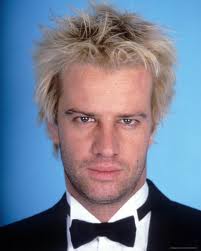 Christopher Lambert first appeared on the big screen in a loin cloth, swinging
into audiences' hearts as Tarzan, lord of the apes. Since then he has enjoyed a successful 25 year career as actor, producer and occasional thunder god. Although he counts himself among
the star's many fans, John has actually only seen a handful of Lambert's more
popular movies (the Highlanders, basically) and therefore made the
questionable decision to embark on the ambitious and possibly pointless task of
seeing all the French-American's films from Greystoke on. That's over
forty films, but John isn't sweating it. It's time for a new kind of magic.
Nothing in the world has prepared you for this. John is building a fortress for
the ultimate takeover... your mind! This is his own personal...LAMBERTATHON
Christopher Lambert first appeared on the big screen in a loin cloth, swinging
into audiences' hearts as Tarzan, lord of the apes. Since then he has enjoyed a successful 25 year career as actor, producer and occasional thunder god. Although he counts himself among
the star's many fans, John has actually only seen a handful of Lambert's more
popular movies (the Highlanders, basically) and therefore made the
questionable decision to embark on the ambitious and possibly pointless task of
seeing all the French-American's films from Greystoke on. That's over
forty films, but John isn't sweating it. It's time for a new kind of magic.
Nothing in the world has prepared you for this. John is building a fortress for
the ultimate takeover... your mind! This is his own personal...LAMBERTATHON
<< click here for Lambertathon Part I: Greystoke, the Legend of Tarzan Lord of the Apes>>
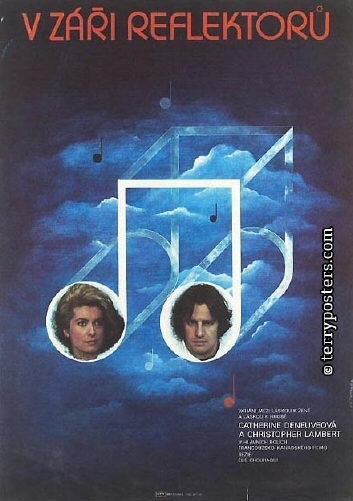 If there's one thing I've learned from the Lambert movies I've seen, it’s that he's unlucky in love. In Highlander, he had to accept the finite lifeline of his
girlfriend, then find out almost five hundred years later that she was raped by
his mortal enemy. In Fortress, he and his wife are arrested and separated
inside a dystopian prison just for wanting to have a baby; once inside she's
accosted by a creepily obsessed Kurtwood Smith. A one night stand with Joan Chen
ends with her head severed from her body at the beginning of The Hunted.
And we saw recently in Greystoke that even when the ball's in his court,
Lambert prefers the company of feuding, unhygienic apes to a blossoming Andie
MacDowell with Glenn Close's voice. In any given movie he's more likely to be
mournin' than courtin'.
If there's one thing I've learned from the Lambert movies I've seen, it’s that he's unlucky in love. In Highlander, he had to accept the finite lifeline of his
girlfriend, then find out almost five hundred years later that she was raped by
his mortal enemy. In Fortress, he and his wife are arrested and separated
inside a dystopian prison just for wanting to have a baby; once inside she's
accosted by a creepily obsessed Kurtwood Smith. A one night stand with Joan Chen
ends with her head severed from her body at the beginning of The Hunted.
And we saw recently in Greystoke that even when the ball's in his court,
Lambert prefers the company of feuding, unhygienic apes to a blossoming Andie
MacDowell with Glenn Close's voice. In any given movie he's more likely to be
mournin' than courtin'.
So I'm not used to the Lambert-as-heartthrob/lite Lambert romantic drama. Until this one I didn't even know such a thing existed, but as it turns out Love Songs is the first of an unconnected trilogy of romance films he made in the 80's, each with the word "love" in at least one of their various titles. It's here that the sensitive side of the actor, on display in his emotional scenes with both human and simian family members in Greystoke, gets to run wild. It's all grins and dimples from the typically glum star; even during a stretch of the movie where his character is debilitatingly ill he looks adorably cozy in bed, and his confrontations with other characters quickly turn into playful banter. If the two animal personas of Lambert are 'the lamb' (softness, sensitivity) and 'the bear' (power, intensity), we're definitely getting 'the lamb' here. And just as he focuses his intensity on immortal combat in his more famous movies, here he pours his sensitivity in a synthesizer. He leaves the guns, swords and improvised jungle weapons untouched in favor of a loaded keyboard and the body of a beautiful woman played by none other than Catherine Deneuve.
In Love Songs (original title Paroles et musique, not to be confused with the Hugh Grant chick flick Music and Lyrics or the recent Christophe Honore film Love Songs with Ludivine Sagnier that's on IFC every day, and certainly not the atrocious Love Song for Bobby Long), Deneuve plays Margaux, a Parisian talent agent associated with some kind of big shot media company. Despite being married with two kids she's always on the go, running from one meeting to another while coordinating and signing acts for big concert events along with co-worker...László Szabó! (I was surprised to see my former acting teacher, notable for his appearances in numerous Godard movies, The Unbearable Lightness of Being and my freshman film - made at SUNY Purchase where he was temporarily and kind of miraculously employed* - pop up in this movie to become part of my sweeping Lamberathon. Hey László! Actually I shouldn't have been surprised, he's appeared with Deneuve in several movies and directed her in his own film Zig zig - yeah, he probably hit that.) So while Deneuve and László are running themselves ragged looking at cheesy bands and opening performance artist acts, Deneuve's American husband decides he doesn't want to be a family man anymore and abruptly abandons her and the kids for lush bachelor life in Montreal.
Hm. I'm not sure what kind of guy would give up Catherine Deneuve, let alone a creative and successful businesslady version of Catherine Deneuve, for anything, even as promising a prospect as single life in Montreal. Even a 40-year-old Catherine Deneuve - hell, even the current Catherine Deneuve - would be vastly preferable. The husband is played by Nick Mancuso, who provided the voice of The Prowler in Black Christmas and is most famous as the Corvette-driving hero of 80's action series "Stingray." He went on to appear in Under Siege 1 & 2, and he kind of looks like Kevin Nealon. If a guy like that is willing to toss Catherine Deneuve to the curb, he negates any right to feel jilted when she logically hooks up with a young, irresistible Christopher Lambert. Which is what happens in this movie (spoiler.)
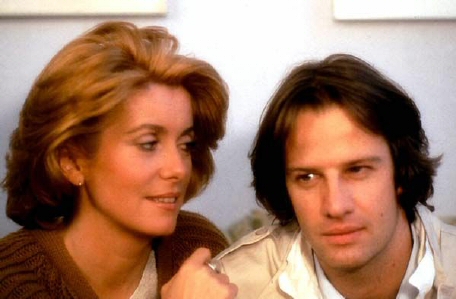 Lambert makes up half of Michel and Jeremy (the "Jeremy" half), a struggling duo of musicians looking for a break. They get noticed by people from Deneuve's group and hired to play at some sort of soft rock Lullapalooza where they sing a
song
(in English) that sounds almost exactly like “Almost Paradise” from
the Footloose soundtrack. Based on the crowd's reaction, they go over
well - I don't know if the word "samba" translates, but apparently these
screaming French teens would in fact be interested to hear more when Lambert
suggestively sings "do the samba with me." Their performance is at least
enough
to get them invited to some kind of industry party where Lambert sees Deneuve
and begins a relentless courting of her that borders on flat-out stalking...not
that I blame him. He chases her home, hopping in and out of a pursuing taxi, and
awkwardly wanders into her apartment with his hands in his pockets like a little
boy expecting something but too afraid to ask for it: Deneuve watches him like a
patient mother. There was a 14 year age difference between the two actors when
the film was made, and it's most apparent during Lambert's adolescent, though
not charmless, wooing tactics.
Lambert makes up half of Michel and Jeremy (the "Jeremy" half), a struggling duo of musicians looking for a break. They get noticed by people from Deneuve's group and hired to play at some sort of soft rock Lullapalooza where they sing a
song
(in English) that sounds almost exactly like “Almost Paradise” from
the Footloose soundtrack. Based on the crowd's reaction, they go over
well - I don't know if the word "samba" translates, but apparently these
screaming French teens would in fact be interested to hear more when Lambert
suggestively sings "do the samba with me." Their performance is at least
enough
to get them invited to some kind of industry party where Lambert sees Deneuve
and begins a relentless courting of her that borders on flat-out stalking...not
that I blame him. He chases her home, hopping in and out of a pursuing taxi, and
awkwardly wanders into her apartment with his hands in his pockets like a little
boy expecting something but too afraid to ask for it: Deneuve watches him like a
patient mother. There was a 14 year age difference between the two actors when
the film was made, and it's most apparent during Lambert's adolescent, though
not charmless, wooing tactics.
They start an affair which she insists on keeping secret from her son and daughter (asleep in adjoining rooms), so Lambert follows the strenuous schedule of bedding Deneuve and waking up with the street-sweeping trucks to rush to yet another audition. Deneuve's initial reluctance to hook up with Lambert and insistence to keep it secluded are surprising: aren't the French used to casual affairs, why is it such a big deal to her? Apparently being abandoned by her American husband has prompted her to handle it in a very American fashion. "Sometimes I envy you," she tells him over the phone, "for having the guts to be a bastard." That's a line you'd think she'd frost over with a little extra Deneuve ice, but it comes off as a pathetic attempt to regain the upper hand in their relationship. It's funny to see Deneuve the character compromise herself while Deneuve the actress does things like actively find younger women in crowd scenes to stand next to in profile as if to prove how much more beautiful she is than them. In over 100 films we've seen Deneuve victimized, murdered, repulsed, shocked, savaged, hustled, hungered and mermaided, but never denigrated over so seemingly little a thing as her husband leaving her. I've certainly not seen all her films, but even when gotten the better of in her films with Bunuel she still held that aura of inflappable class. So it's weird to find her such a wreck: talked down to by her boss, betrayed by her husband and muscled by her daughter.
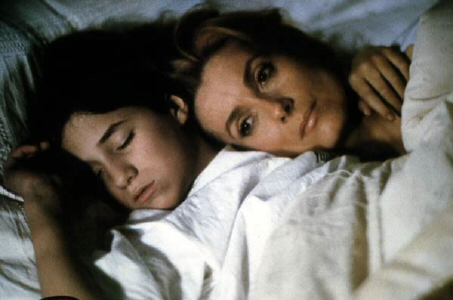 Yep, that's Charlotte Gainsbourg in her film debut as Deneuve's
daughter "Charlotte." At one point
she's even wearing a shirt with her name on it - I guess she had an
overenthusiastic agent who made them put that into her contract... or it could
just be a coincidence. She's easily recognizable (even her
breast size is
the same) and you can see a real
performer potential in her, even when she's just sitting on the carpet watching
"Inspector Gadget" dubbed in French. Whether or not the film's cheesy music
(more on that later) inspired her own musical career is up for argument. Playing
the daughter caught in the middle of a shaky family situation would become a
recurring thing for her: in her next two films, Impudent
Girl/The Hussy and Charlotte for Ever, she would star as a kid
growing up in a poor family without a mother and one living with an alcoholic,
suicidal screenwriter-father. In both of those movies her character was also
named "Charlotte." I bring this up because it suggests some kind of
autobiographical context to these roles, especially since they all involve her
character's devotion to her father. In Love Songs she pouts over dad's
absence and treats Deneuve like a rival, reporting all her extramarital
activites to her father over the phone and giving her a hard time in general.
This isn't surprising when you
think about how close Gainsbourg was to her famous father (sometimes
uncomfortably close.) She could have been working out some daddy issues in
these early roles...or it could just
be a coincidence.
Yep, that's Charlotte Gainsbourg in her film debut as Deneuve's
daughter "Charlotte." At one point
she's even wearing a shirt with her name on it - I guess she had an
overenthusiastic agent who made them put that into her contract... or it could
just be a coincidence. She's easily recognizable (even her
breast size is
the same) and you can see a real
performer potential in her, even when she's just sitting on the carpet watching
"Inspector Gadget" dubbed in French. Whether or not the film's cheesy music
(more on that later) inspired her own musical career is up for argument. Playing
the daughter caught in the middle of a shaky family situation would become a
recurring thing for her: in her next two films, Impudent
Girl/The Hussy and Charlotte for Ever, she would star as a kid
growing up in a poor family without a mother and one living with an alcoholic,
suicidal screenwriter-father. In both of those movies her character was also
named "Charlotte." I bring this up because it suggests some kind of
autobiographical context to these roles, especially since they all involve her
character's devotion to her father. In Love Songs she pouts over dad's
absence and treats Deneuve like a rival, reporting all her extramarital
activites to her father over the phone and giving her a hard time in general.
This isn't surprising when you
think about how close Gainsbourg was to her famous father (sometimes
uncomfortably close.) She could have been working out some daddy issues in
these early roles...or it could just
be a coincidence.
The most charming moment in the film comes when Lambert wins over the immovable Gainsbourg. Disarming her haughty attitude over the kitchen counter with but a few words and that irresistible smirk and making it look easy, he's like the ideal stepfather. He takes the kids to school, plays with them at home and hangs around the house in his underwear, which for most stepfather figures would be frowned upon but this is young Lambert we're talking about (plus it's France, underpants are an important part of culture.) Outdoors he wears more clothes, usually some funny post-punk 80's ensemble like a beige sportscoat over a t-shirt with the sleeves rolled up, or yellow pants, dirty blue socks and a tight red shirt that says LIFEGUARD. Hunched over the keyboard like Elton John, treating the mike like a wall he's in danger of running into, he seems to be having a good time.
So it's hard to fault him that the movie is a largely inoffensive distraction that doesn't really go anywhere. There’s a lot of cathartic face-slapping but nothing of any real consequence. And it’s hard to say who the main character is exactly. It starts off being Deneuve and her struggle with the separation/kids, but then it focuses on Lambert in the second half as he tries to figure out whether this lady is into him for the long run, or if their love is just a phase as Deneuve and her husband reconcile. By the time we reach the epic climatic scene in - uh - Montreal, where Lambert finds out he is in fact a disposable boy toy, the filmmakers haven't created any kind of significant conflict. The movie's not, as a possible alternative title would suggest, A Lambert to Remember.
And for fans expecting a passionate Highlander vs Belle de jour clash, the sad truth is that there's not much chemistry between Love Songs' lovers. At this point in her career Deneuve is just a little too regal and proper to tap into that youthful innocence her character apparently rediscovers through Lambert. It's one of those movies where both romantic leads are undeniably attractive and charming on their own but can't get any sparks going together (like DiCaprio and Diaz in Gangs of New York...or Jim Belushi and Tupac in Gang Related.) It's not just the age difference - the main problem is that a more natural and believable love story exists between Lambert and his musical partner Michel (who by the way looks like Paul McCartney meshed up with Ringo Starr.) Whether working together as waiters and arguing over lyrics while serving customers or joking around with each other over which one is going to someday be most desired by the ladies, they give off a distinctive air of closeness that seems to go a little beyond bromance. Their relationship is best exemplified in a scene in their shared one-room apartment where tension leads to roughhousing that almost ends in full-blown making out. But like the main plot, this one doesn't really go anywhere. While Lambert is carrying on his affair (his Lambert Affair - good title for a possible spy movie where he plays himself**) Michel auditions as a solo act and scores a record contract. That would have made for decent conflict, but since Lambert already repeatedly assured his collaborator that it was ok to continue his music career without him the "betrayal" doesn't have quite the dramatic impact that it should. And weirdly enough, Lambert never uses his love songs to charm Deneuve/his partner or win her/him back...getting dumped inspires him to write material for a new album but that's it. Deneuve didn't love him for his love songs (maybe it was the LIFEGUARD shirt) so why is it important that he's a musician in an up-and-coming cheesy band at all?
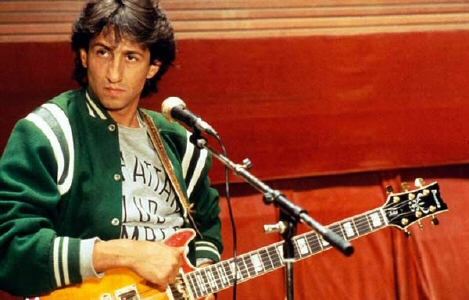 Which brings us to the music. Rounding out the nouvelle vogue veterans is Godard's composer Michel Legrand, who wrote the paroles et musique for the flick.
Legrand's specialty is writing achingly sad songs for movies: over the years
he's penned "The Hands of Time" for uber-weepy Brian's Song, the
Oscar-winning "Windmills of Your Mind" from The Thomas Crown Affair
("half-remembered names and faces/but to whom do they belong/when you knew that
it was over/were you suddenly aware/that the autumn leaves were turning/to the
color of your hair") and "Papa Can You Hear Me?" from Barbra
Streisand's Yentl, which I've never heard but my wife assures me is
heart-wrenching (she then went on to sing most of the song for me, and kept
talking about Mandy Patinkin's beard for the rest of the day.) He
also wrote the saddest song I've ever heard, "I Will Wait for You" from his
previous collaboration with Deneuve, The Umbrellas of Cherbourg (later
used in a "Futurama" episode that I literally can't even watch so unbearably
depressing is the ending.) So we know his credentials in the suicide-inducing
sad song department are legit, but what about his love songs? You would think
that in a movie called Love Songs, the love songs would be pretty good,
right? Well, they range from unmemorable to intolerable. They really do sound
like rejects from the Footloose/Flashdance/Fast Forward
soundtracks, which I understand was the style at the time but even when compared
to the cheesiest chart toppers from the same year (John Waite's "Missing You,"
Steve Perry's "Oh Sherrie," Lionel Ritchie's "Hello") they lack any sense of
beat or basic construction. The year before
he wrote the theme song for the WB-produced Bond adventure Never Say Never
Again which is extremely goofy but sounds like an actual song.
I
guess it's ironic that the love songs in a movie called Love Songs are
the least romantic thing about it, but Legrand's attempts to "share the love
with everybody" (as one of the least inspiring lyrics goes) falls flat.
Which brings us to the music. Rounding out the nouvelle vogue veterans is Godard's composer Michel Legrand, who wrote the paroles et musique for the flick.
Legrand's specialty is writing achingly sad songs for movies: over the years
he's penned "The Hands of Time" for uber-weepy Brian's Song, the
Oscar-winning "Windmills of Your Mind" from The Thomas Crown Affair
("half-remembered names and faces/but to whom do they belong/when you knew that
it was over/were you suddenly aware/that the autumn leaves were turning/to the
color of your hair") and "Papa Can You Hear Me?" from Barbra
Streisand's Yentl, which I've never heard but my wife assures me is
heart-wrenching (she then went on to sing most of the song for me, and kept
talking about Mandy Patinkin's beard for the rest of the day.) He
also wrote the saddest song I've ever heard, "I Will Wait for You" from his
previous collaboration with Deneuve, The Umbrellas of Cherbourg (later
used in a "Futurama" episode that I literally can't even watch so unbearably
depressing is the ending.) So we know his credentials in the suicide-inducing
sad song department are legit, but what about his love songs? You would think
that in a movie called Love Songs, the love songs would be pretty good,
right? Well, they range from unmemorable to intolerable. They really do sound
like rejects from the Footloose/Flashdance/Fast Forward
soundtracks, which I understand was the style at the time but even when compared
to the cheesiest chart toppers from the same year (John Waite's "Missing You,"
Steve Perry's "Oh Sherrie," Lionel Ritchie's "Hello") they lack any sense of
beat or basic construction. The year before
he wrote the theme song for the WB-produced Bond adventure Never Say Never
Again which is extremely goofy but sounds like an actual song.
I
guess it's ironic that the love songs in a movie called Love Songs are
the least romantic thing about it, but Legrand's attempts to "share the love
with everybody" (as one of the least inspiring lyrics goes) falls flat.
I haven't been able to determine whether or not Lambert did his own singing. It sure doesn't sound like his voice. At this early point in the Lamberathon I'm not sure of our subject's range of musicality. I don't know if he got a chance to explore this avenue of his talents again (is there a musical number in Mortal Kombat?), but something tells me after this movie he'd had enough of silly love songs. Although the film wasn't released in the US until 1986, it came out in France just a few months after Greystoke and may as well be grouped with his bit parts in forgotten French movies made before his career breakout.
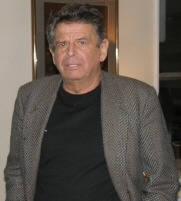 * I also acted in a short film with László directed by none other than Chris Funderburg. The
set-up was that I run over László's son with my car (repeatedly) and react so
existentially (read: callously) to the accident that he beats the shit out of
me. The late shoot was delayed for various reasons (some equipment arriving
late, a child actor whose scenes had to be shot first to avoid any Twilight
Zone Movie-esque incidents, my own subpar performance that required several
re-takes) and László, who was doing this for free as a favor to Chris, was
becoming increasingly impatient and irritable. He kept complaining about how
cold it was even though it was early spring and the weather was more than
tolerable, and as we stood waiting in the lobby of the Humanities building on
campus I spied him sneaking a flask out of his coat pocket and taking swigs of
what had to be something particularly strong. I say that because I'd seen László
drink before, and his well-established tolerance level was notably high...yet he
was starting to slur words and stagger around after a few shots of this stuff.
It wasn't long before he wasn't so much sneaking drinks as tearing open the
flask and almost hitting me in the face with it as he lurched it up to his lips.
He was getting angry, and I was getting worried...remember, this was all leading
up to him pounding the shit out of my character, i.e. me. Was all his
frustration going to come out in a drunken Hungarian-style beatdown on yours
truly? I think I expressed my concern to Chris, who dismissed it with something
bureaucratic like "Just go with it." Anyway long story short, László managed to
restrain himself despite his foul mood and the complete lack of fight
choreography, although I did receive a few badly-aimed kicks to the ribcage.
Whatever, I manned up for it - this guy was in Week(end)!
* I also acted in a short film with László directed by none other than Chris Funderburg. The
set-up was that I run over László's son with my car (repeatedly) and react so
existentially (read: callously) to the accident that he beats the shit out of
me. The late shoot was delayed for various reasons (some equipment arriving
late, a child actor whose scenes had to be shot first to avoid any Twilight
Zone Movie-esque incidents, my own subpar performance that required several
re-takes) and László, who was doing this for free as a favor to Chris, was
becoming increasingly impatient and irritable. He kept complaining about how
cold it was even though it was early spring and the weather was more than
tolerable, and as we stood waiting in the lobby of the Humanities building on
campus I spied him sneaking a flask out of his coat pocket and taking swigs of
what had to be something particularly strong. I say that because I'd seen László
drink before, and his well-established tolerance level was notably high...yet he
was starting to slur words and stagger around after a few shots of this stuff.
It wasn't long before he wasn't so much sneaking drinks as tearing open the
flask and almost hitting me in the face with it as he lurched it up to his lips.
He was getting angry, and I was getting worried...remember, this was all leading
up to him pounding the shit out of my character, i.e. me. Was all his
frustration going to come out in a drunken Hungarian-style beatdown on yours
truly? I think I expressed my concern to Chris, who dismissed it with something
bureaucratic like "Just go with it." Anyway long story short, László managed to
restrain himself despite his foul mood and the complete lack of fight
choreography, although I did receive a few badly-aimed kicks to the ribcage.
Whatever, I manned up for it - this guy was in Week(end)!
Upon examination of his filmography, László also appeared in Desplechin's early effort The Sentinel (not to be confused with the Michael Winner horror film or the horrible Michael Douglas movie.) I should see it - Ricky Butler's a big fan of that one. [oh, well, Ricky Butler says... - christopher]
** Or how about he stars in a flick with Miguel Ferrer called The Lambert-Ferrer Affair? Somebody should make me the head of a major studio.
<<Previous Page 1 2 Next Page>>
home about contact us featured writings years in review film productions
All rights reserved The Pink Smoke © 2010